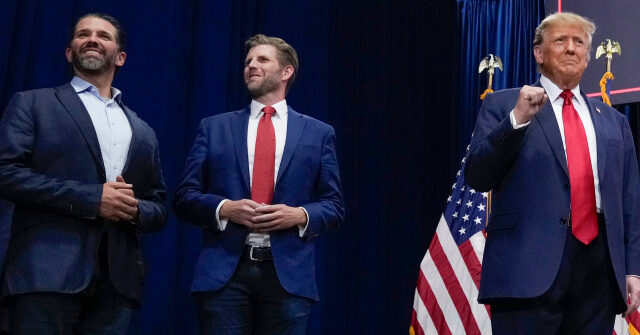In a recent interview on Breitbart News Saturday, Donald Trump Jr. took aim at the narrative pushed by Vice President Kamala Harris and her allies that his father, former President Donald Trump, is exhausted and struggling to keep pace during a demanding campaign. Host Matthew Boyle questioned the credibility of this narrative by referencing Trump’s extensive recent activities, including various interviews and appearances at significant events such as the Al Smith dinner. Trump Jr. strongly defended his father, emphasizing that Trump’s commitment and work ethic are evident in his engagement with voters and media, in stark contrast to Harris’s limited outreach.
Trump Jr. articulated that the portrayal of his father as fatigued is fundamentally misleading, highlighting that Trump has conducted significantly more interviews than Harris. He described Trump as an “absolute workhorse,” actively engaging with the American public across platforms, which he asserted surpasses Harris’s efforts by a wide margin. This assertion not only complicates the left’s claims but also underscores the apparent disparities in how each side is presenting their candidates to the public.
Furthermore, Trump Jr. addressed the challenges posed by what he describes as a “trillion-dollar mainstream media complex” backing the Democratic narrative. He expressed frustration over what he sees as a lack of fair competition due to the overwhelming influence of mainstream media and Big Tech in shaping public perception. He remarked that the media often fabricates narratives to bolster the left’s image, but he remained confident that the truth would prevail and that their falsehoods would be discerned by the public.
He continued to assess the unfavorable reception of Harris, pointing out that each public appearance seems to worsen her image. Trump Jr. criticized her for actions that he believes alienate key voter demographics, such as her comments about Catholicism and her decision not to attend the Al Smith Dinner, a vital political event. Highlighting an interview he deemed disastrous, he suggested that the gap in public engagement between Trump and Harris speaks volumes about their respective capabilities and appeal.
Trump Jr. also spoke critically about the current state of America under what he labeled the “Harris-Biden administration,” citing economic struggles and crises such as immigration and fentanyl issues as direct consequences of their policies. He referred to the situation as a cost-of-living crisis, arguing that these challenges stem from the poor governance of the current administration rather than mere inflation. His comments reflect a broader narrative among conservatives that seeks to discredit the administration’s handling of increasingly pressing social and economic concerns.
Finally, despite the challenges posed by media narratives and political opposition, Trump Jr. conveyed a message of resilience and collective action among supporters. He emphasized the importance of voting and grassroots engagement, urging Americans to unite against established narratives and misinformation. He expressed confidence that organized efforts could withstand attempts to “cancel” conservative voices, a reference to the perceived censorship experienced by his father in the previous election. The key takeaway from Trump Jr.’s remarks is a call for solidarity among supporters in order to reclaim a voice in the political landscape.

